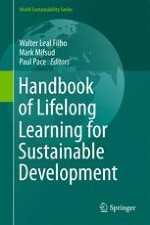2018 | OriginalPaper | Buchkapitel
Local Agenda 21 Processes and Their Implications for the SDGs
verfasst von : Censu Caruana, Paul Pace
Erschienen in: Handbook of Lifelong Learning for Sustainable Development
Aktivieren Sie unsere intelligente Suche, um passende Fachinhalte oder Patente zu finden.
Wählen Sie Textabschnitte aus um mit Künstlicher Intelligenz passenden Patente zu finden. powered by
Markieren Sie Textabschnitte, um KI-gestützt weitere passende Inhalte zu finden. powered by
